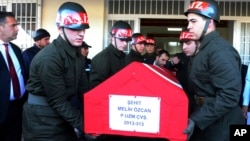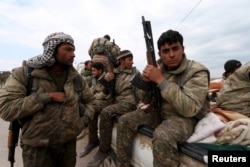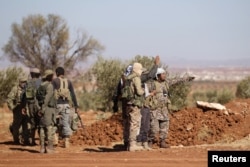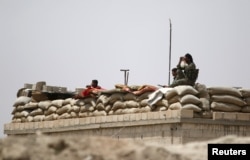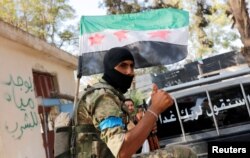Turkish F-16 warplanes were put on emergency standby Thursday after Ankara accused the Syrian government of having carried out an airstrike on Turkish troops operating in northern Syria that left three soldiers dead and 10 others wounded, one critically.
Western diplomats expressed concern the airstrike overnight Wednesday by a Syrian air force L-39 Albatros light-attack warplane marks a highly dangerous turn of events in the five-year-long Syria conflict and risks bringing Syria and Turkey into a major clash.
Initially, the death of the soldiers near the town of al-Bab, northeast of Aleppo, was blamed on the Islamic State (IS) terror group. But in a statement Thursday the Turkish military said the Syrian air force was responsible. The bodies of the killed soldiers were transferred to the southern Turkish border town of Kilis.
"In the air strike assessed to have been by Syrian regime forces, three of our heroic soldiers were killed and 10 soldiers wounded, one seriously," according to a Turkish armed forces statement.
The Syrian government has so far failed to comment. A pro-opposition network of activists, the Syrian Observatory for Human Rights, disputed Ankara's claim, saying it believed the Turkish deaths were caused by an IS suicide bomb.
President Recep Tayyip Erdogan and Prime Minister Binali Yıldırım held emergency phone calls with Defense Minister Fikri Isık and the Chief of General Staff Gen. Hulusi Akar before placing a gag order on the Turkish media, ordering broadcasters not to report on the attack.
Yıldırım vowed later that the attack will “not be left unanswered." He told reporters that the alleged air strike won't affect the Turkish army’s determination to clear northern Syria of "terrorist groups."
"This attack and other such attacks will be retaliated,” he said.
Turkish opposition politician Kemal Kılıcdaroglu warned the air strike could drag Turkey into a "perilous process" and urged the government to act with restraint.
Turkish military targeted
The airstrike marks the first time the forces of Syrian President Bashar al-Assad have targeted the Turkish military since the launch in northern Syria 94 days ago of operation Euphrates Shield, a Turkish-led intervention with Syrian rebel militias aimed at pushing back from Turkey’s border both ISIS militants and the Kurdish militiamen of the People’s Protection Units, or YPG, who Ankara fears want to carve out an independent state in northern Syria.
Earlier this week, Turkish military sources told VOA that Syrian radar defense systems had "locked on" to Turkish warplanes conducting bombing runs on ISIS and YPG positions. No missiles, though, were fired on the jets. “We took it as a warning,” a Turkish air force officer said.
Western officials have expressed concern in recent days that Euphrates Shield would trigger some kind of military response from Damascus as it moved away from the immediate border area and focused on al-Bab, a strategic town 46 kilometers from Aleppo currently held by ISIS militants. The town is coveted by rebel militias, the YPG and the Syrian government.
“This is a warning shot to the Turks to stay away from al-Bab. Hopefully it is just that, but it risks a potentially catastrophic escalation of the war,” a Western diplomat told VOA.
Euphrates Shield forces, featuring Turkish soldiers and militiamen from the Free Syrian Army (FSA), have been as close as two kilometers from the town of al-Bab for several days, according to FSA commanders, but had refrained from assaulting the center of the town.
Fighting escalates
Fighting between Turkish-backed rebels and the Kurdish-dominated Syrian Democratic Forces (SDF), earmarked by the United States to retake Raqqa from ISIS militants, escalated dramatically this week, largely provoked by Euphrates Shield forces advancing towards al-Bab and a town to the north-east, Manbij.
The intensifying clashes have been complicating Washington’s bid to use Kurdish-led forces to launch a full-scale assault on the jihadists’ self-proclaimed Syrian capital of Raqqa, and are maneuvering the U.S. and Turkey into ever greater cross-purposes in Syria, Western diplomats and analysts say.
Last week, the Pentagon announced it was withdrawing special forces personnel detailed to the Turks’ Euphrates Shield operation - highlighting the increasingly conflicting priorities between the United States and Turkey.
The SDF is also keen to overrun al-Bab and has vowed to capture the town before the Turkish-based militias do. A major confrontation between the two sides over the town has been anticipated for months, and the Turkish airstrikes against the YPG have mainly focused on disrupting Kurdish forces moving from Manbij south-west to al-Bab.
US position
On Monday, a Pentagon spokesman told a Turkish newspaper that the United States does not endorse the YPG’s offensive to capture al-Bab. "We do not support nor condone any maneuvers in this area, which only help Daesh who is now on the run across Iraq and Syria,” said Eric Pahon, a Pentagon spokesman.
But he also indicated disapproval of Turkey-backed targeting of the town. “Turkey's operations are being conducted unilaterally and not as part of the Coalition effort,” he said.
For the Assad government the capture of al-Bab by Euphrates Shield-aligned rebel militias would represent a danger to its months-long siege of insurgent-held districts of eastern Aleppo.
Control of al-Bab would help FSA and Islamic militias to smuggle in weapons and aid to eastern Aleppo, which are under scorched-earth airstrikes by Syrian government and Russian warplanes.
In the case of the Euphrates Shield forces around al-Bab, Turkish soldiers have been in the vanguard, say Western military officials. Elsewhere, they have held back and the spearhead role has been taken by Syrian rebels. Why the switch is unclear, but some Western diplomats suggested this week that it was a signal to Damascus that it would be Turkish soldiers occupying the town when seized and not Syrian insurgents — a move they suspected aimed at mollifying Damascus. If that is the reason, judging by Wednesday’s airstrike, it would appear to have failed.




